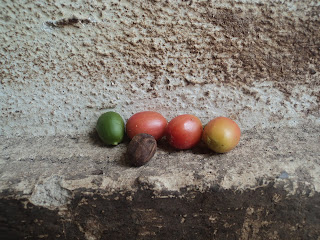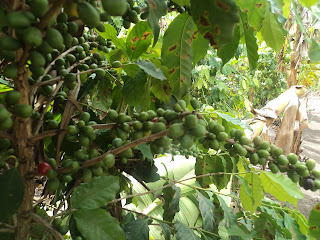Saturday, June 2, 2012
Wednesday, May 30th, 2012
Because today (Wednesday, May 30th, 2012) is a free day, I had the opportunity to work on this blog and invite others to view it using social networking site…. I also had the opportunity to drink coffee for most of the day. What importance does coffee have on a blog about human rights and to the work we are doing here you may ask? Quite a bit actually. On the day that Dona Zenilda brought us to the gardens and showed us all of the plants that can be used for medicinal purposes, we were shown a coffee tree, which was probably the first time for many of us. Naively, I had always thought that coffee beans were already brown when they were picked and that they grew from a plant similar to green beans or peas – one that is very short and dies every year. I was very surprised when Dona Zenilda pointed out the coffee TREE to me and the beans were bright GREEN.
I was told that the beans go from green (when they are not ripe) to bright red (when they are fully mature), and that the dark brown coffee beans are actually a result of them having been dried. We were then shown how these dried beans were prepared for the coffee ground that we know. Dona Zenilda placed them in a stone grinder, and hand ground them and then let us all try. She made it look very easy and went very quick. When I tried to grind the beans I could barely turn the grinder once. This is another testament to how amazing Dona Zenilda is. One thing that I found very interesting about the coffee in this region, is that sometimes our coffee is prepared and served with sugar already in it. I am told that sugary coffee is served this way in areas that manual labor is common because the sugar provides an extra source of energy that is very much needed. This is a great opportunity for me to tell you how hard the people here work. They wake up at five o’clock every morning, have breakfast with their family, go to work a hard manual labor job, drink sugary coffee to keep their energy high, and don’t stop working until it gets dark (which is around five p.m.). These people do all of this while still fighting for their land and fighting for their rights as human beings. This is why coffee relates to a blog about human rights, because coffee is helping these people push forward and carve out a better way of living for their community and it also provides a medium for social interaction among community members. Many times has an offering of a cup of coffee started a conversation with a local, resulting in a stronger relationship with the people here.
Beth
Posted by
Marcia Mikulak - Associate Professor, University of North Dakota Dept. of Anthropology
at
3:31 PM


Subscribe to:
Post Comments (Atom)




No comments:
Post a Comment